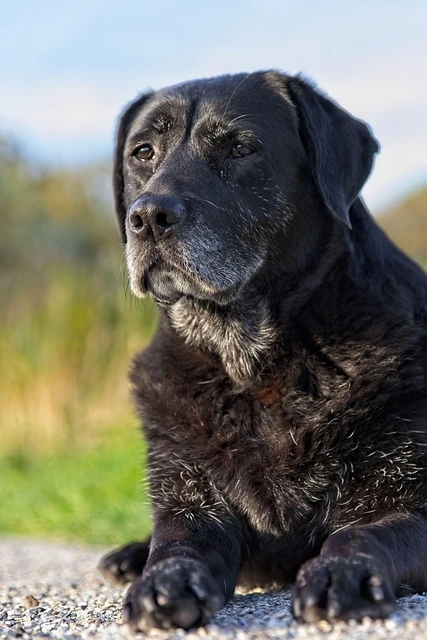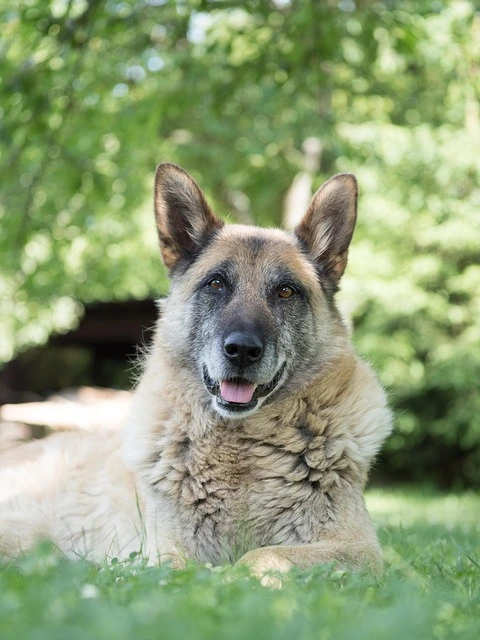Senior dogs are often misunderstood, leading to misconceptions that can discourage adoption and proper care. These myths not only prevent many wonderful older dogs from finding loving homes but can also result in inadequate care for aging companions.
In this comprehensive guide, we’ll separate fact from fiction by exploring and debunking the most common myths about senior dogs. Whether you’re considering adopting an older dog or looking to provide the best care for your aging companion, understanding the truth behind these misconceptions is essential.

What Makes a Dog “Senior”?
Before diving into the myths, it’s important to understand when a dog is considered “senior.” The aging process varies significantly depending on breed and size:
- Small breeds (under 20 pounds): Generally considered senior around 7-10 years
- Medium breeds (20-50 pounds): Usually reach senior status at 7-8 years
- Large breeds (50-90 pounds): Often considered senior at 6-7 years
- Giant breeds (over 90 pounds): May be considered senior as early as 5-6 years
Remember that these are general guidelines, and individual dogs age at different rates based on genetics, environment, nutrition, and healthcare.
Myth #1: Senior Dogs Can’t Learn New Tricks
Reality: The old adage “you can’t teach an old dog new tricks” couldn’t be further from the truth. Senior dogs are not only capable of learning new commands and behaviors but often excel at training.
Why This Myth Persists: This misconception stems from the observation that older dogs may take slightly longer to learn new commands compared to younger dogs. However, this overlooks their significant advantages.
The Facts:
- Senior dogs typically have longer attention spans than puppies
- They’re often more focused during training sessions
- Their extensive life experience provides valuable problem-solving skills
- Many senior dogs are already familiar with basic commands
- Older dogs are usually more motivated by rewards and praise
Expert Tip: Keep training sessions short (5-10 minutes) and positive for senior dogs. Use high-value treats and be patient with any physical limitations they might have.
Myth #2: Senior Dogs Require Less Exercise
Reality: While senior dogs may have lower energy levels than puppies, they still need regular physical activity to maintain health, mobility, and mental stimulation.
Why This Myth Persists: People often confuse a natural decrease in hyperactivity with a need for less exercise overall.
The Facts:
- Regular, appropriate exercise helps maintain joint mobility
- Physical activity prevents weight gain, which can exacerbate age-related conditions
- Exercise stimulates circulation and supports cardiovascular health
- Mental stimulation from outdoor activities prevents cognitive decline
- Activity strengthens the human-animal bond
Expert Tip: Adjust exercise type and duration to your senior dog’s abilities. Consider low-impact activities like swimming, gentle walks, or interactive puzzle games if mobility is an issue.
Myth #3: All Senior Dogs Have Health Issues
Reality: While aging dogs are more prone to certain health conditions, many senior dogs remain perfectly healthy well into their golden years.
Why This Myth Persists: We tend to focus on stories of health challenges rather than the many senior dogs living active, healthy lives.
The Facts:
- Preventive care significantly reduces age-related health issues
- Many “senior” conditions are manageable with proper care
- Regular veterinary check-ups can catch potential problems early
- Appropriate diet and exercise support ongoing health
- Genetics plays a major role in how dogs age
Expert Tip: Schedule bi-annual veterinary check-ups for senior dogs to catch potential issues early. Many conditions are manageable when detected in their initial stages.
Veterinary professionals emphasize that proactive senior care, including regular health screenings and age-appropriate wellness plans, significantly extends quality of life for older dogs.
Myth #4: Senior Dogs in Shelters Have Behavioral Problems
Reality: Most senior dogs end up in shelters due to their owners’ life changes, not because of behavioral issues.
Why This Myth Persists: People often assume that if a dog is in a shelter, especially an older one, there must be something “wrong” with them.
The Facts:
- Common reasons senior dogs enter shelters include:
- Owner’s death or serious illness
- Financial hardship
- Housing changes (moving, landlord issues)
- Owner’s work schedule changes
- Family circumstances (divorce, new baby)
- Many senior shelter dogs were beloved pets who fell victim to unfortunate circumstances
- Senior dogs often adjust quickly to new homes due to their previous experience living with families
Expert Tip: When adopting a senior dog, ask shelter staff about the dog’s history and previous living situation to better understand their background and needs.
Myth #5: Senior Dogs Can’t Adjust to New Homes
Reality: Many senior dogs adapt remarkably well to new environments, often more quickly than younger dogs.
Why This Myth Persists: There’s a misconception that older dogs are set in their ways and cannot form new bonds.
The Facts:
- Senior dogs have life experience that helps them adjust to new routines
- Most older dogs have lived in homes before and understand household expectations
- Senior dogs often form deep bonds with new owners, showing immense gratitude
- Older dogs typically have established house training and basic manners
- They’re usually past the destructive puppy phase
Expert Tip: Create a consistent routine when bringing a senior dog home, and provide a quiet space where they can retreat if feeling overwhelmed. Give them time to adjust at their own pace.
Myth #6: Senior Dogs Are Less Affectionate
Reality: Senior dogs often form deeper, more meaningful bonds with their owners and can be extraordinarily loving and loyal companions.
Why This Myth Persists: People sometimes mistake a senior dog’s calmer demeanor for detachment or lack of affection.
The Facts:
- Many senior dogs become more focused on their human companions
- Their mature temperament allows for more meaningful interaction
- Senior dogs often show profound gratitude to those who adopt them
- Many older dogs become more cuddly and affectionate with age
- They express their attachment through gentle, consistent companionship
Expert Tip: Senior dogs may express affection differently than puppies—through quiet companionship, gentle leaning against you, or simply staying close by. Appreciate these subtle expressions of love.
Myth #7: Adopting a Senior Dog Means Heartbreak Is Near
Reality: Many senior dogs live for years after adoption, providing just as much joy and companionship as younger dogs.
Why This Myth Persists: People fear the emotional pain of losing a pet and assume adopting an older dog means facing this sooner.
The Facts:
- Many “senior” dogs, especially small breeds, live 5-10+ years after being classified as seniors
- There are no guarantees with any pet’s lifespan, regardless of age
- The profound impact of giving a senior dog a loving home far outweighs the eventual grief
- Senior dogs often provide a special kind of companionship that enriches lives immeasurably
- Many adopters say the time with their senior dog, however long, was deeply rewarding
Expert Tip: Focus on providing quality of life rather than worrying about quantity of time. The joy and fulfillment of giving a senior dog a loving home is immeasurable.
Benefits of Adopting a Senior Dog
Beyond debunking myths, it’s worth highlighting the unique advantages of bringing a senior dog into your home:
- What you see is what you get: Their size, personality, and energy level are already established
- Less intensive training needs: Most are house-trained and know basic commands
- Calmer presence: Perfect for quieter households or first-time dog owners
- Immediate companionship: Many settle in quickly and become loyal friends
- Less destruction: Past the chewing and hyperactive puppy phase
- Great match for seniors: Their energy level often matches well with older adults
- Profound gratitude: Many adopters report senior dogs seem to understand they’ve been given a second chance
Senior Dog Care Essentials
To help your senior dog thrive:
- Regular veterinary care: Schedule check-ups every 6 months
- Appropriate diet: Consider senior-specific formulas with joint support that address the unique nutritional requirements of aging dogs
- Comfortable bedding: Provide orthopedic beds to ease joint pressure
- Accessible environment: Use ramps, steps, or lifts for furniture access
- Dental care: Maintain oral health with regular cleaning
- Mental stimulation: Use puzzle toys and gentle training sessions
- Adjusted exercise: Maintain activity at appropriate levels for mobility
- Weight management: Keep weight optimal to reduce strain on joints
- Patience and understanding: Accommodate changing needs with compassion
Final Thoughts
Senior dogs have so much love and wisdom to offer. By debunking these common myths, we hope to inspire more people to consider opening their homes to these wonderful companions. Whether you’re adopting a senior dog or caring for your lifelong friend as they age, understanding the truth behind these misconceptions will help you provide the best possible care.
Every senior dog deserves the chance to live out their golden years in comfort and happiness. They offer a special kind of companionship that’s truly irreplaceable—loyal, steadfast, and full of quiet wisdom that only comes with age.
Frequently Asked Questions
At what age is a dog considered a senior?
Most dogs are considered senior between 7–10 years old, depending on breed and size. Large breeds age faster, while smaller breeds may not show senior signs until later.
Do senior dogs still need regular exercise?
Yes. Older dogs benefit from daily walks and light play, which keep joints flexible and maintain a healthy weight. The intensity should be adjusted to your dog’s comfort and health condition.
Should senior dogs eat special food?
Many older dogs benefit from senior-specific diets that support joint health, maintain lean muscle, and control calories. Always consult your veterinarian before switching foods.
Do senior dogs lose interest in play?
Not necessarily. While energy may decrease, most senior dogs still enjoy interactive play, puzzle toys, and gentle games. Mental stimulation is just as important as physical activity.
Are all behavior changes in senior dogs due to aging?
No. Some changes may signal medical issues like arthritis, dental pain, or cognitive decline. Any sudden shifts in mood, appetite, or mobility should be checked by a vet.
Is adopting a senior dog a bad idea?
Not at all. Senior dogs often make wonderful companions. They are typically calmer, already house-trained, and eager for love. With proper care, many can live happily for years.
Do senior dogs always develop health problems?
Not always. While risks increase with age, many dogs stay healthy into their senior years with regular vet visits, balanced nutrition, and an active lifestyle.
How often should senior dogs see the vet?
Veterinarians recommend checkups at least twice a year for senior dogs. This allows early detection of age-related conditions and ensures timely treatment.

